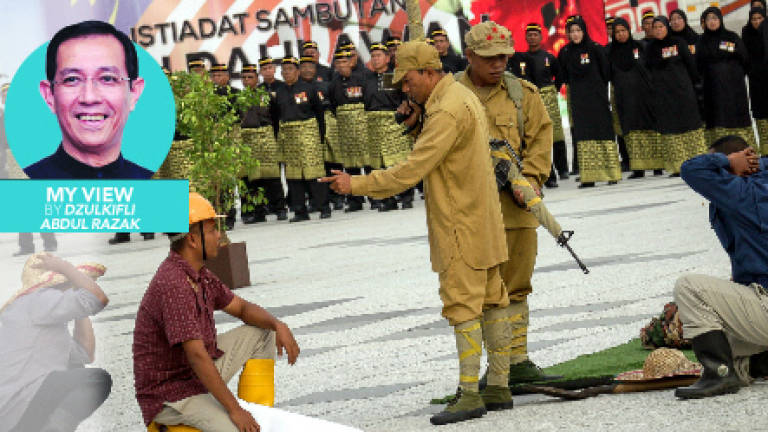No more leaflets to warn us

IN a fortnight, we will celebrate Merdeka for the 60th time. As a child I can vividly recollect back then how hundreds of leaflets were "thrown out" from an aeroplane that flew periodically above a jungle near where I lived in Tanjung Malim. They had specific messages and instructions printed on them directed to the insurgents, namely members of the Malayan Communist Party (MCP) who were supported by the Communist Party of China.
The messages called on them to lay down their arms and denounced the insurgency to establish a communist vassal loyal to the leaders of Communist China.
In today's terms they were "terrorists" resolved to emplace their ideology by hook or by crook like how China turned communist in the 1940s. The strategy was generally to "encircle" and "capture" the cities.
For this, the MCP leaned heavily on the local counterparts as "sympathisers" to further their cause. So much so even long after the "war" against the communists was declared over, I remember there were still university students belonging to a language society being nabbed as communist supporters.
It was clear that the "struggle" to spread their "beliefs" was continuing not unlike the IS propaganda effort now. When the "hard" ways through physical means proved impossible, they resorted to the "soft" alternatives to arrive at the same goal of undermining the government.
"Fake news" as it is now known was the diet then. Indeed, the use of "softpower" is well acknowledged today as a clandestine tool to subvert legitimate governments.
As such, most people are lulled as to the "hidden" agenda to "influence" the situation to be more favourable for the perpetrators. This is carried out through seemingly "friendly" gestures of extending "help" for a particular strategy as part of the required investment.
The hard-to-refuse offers range from financial aid to other "goodies" with little awareness on the part of the locals. Much of this can be gleaned from other developing nations that now lament that they have been (re)colonised in subtle ways. Where there are diaspora of "sympathisers" the (re)colonisation is even more slick since they willingly assume the role of middlemen like earlier.
The creation of new villages during the insurgency was a living testimony of how the sympathisers were contained from acting as conduits for the terrorists. In the IT era this is more difficult to do.
There are parallels between what is seen today and days of the insurgency; except that now we are naively "blinkered" by the tantalising persuasion of the "softpower".
The many opportunities generously offered are often laced with the aim to nudge opinions and options towards issues that are of great interest globally.
Through this means "new" sympathisers or supporters are being selectively recruited. Such calculated moves, at some stage, become instrumental in the bid for greater influences including soliciting for (mega) projects.
A classic recent example is the case in Singapore of a "prominent academic" allegedly a US citizen of Chinese descent, who worked at the prestigious Lee Kuan Yew School of Public Policy. He was reportedly an "agent of influence of a foreign country".
Admittedly, "softpower" works best through "education" where young unsuspecting minds can be duly shaped (read indoctrinated).
Mobility programmes and branch campuses under the cover of "internationalisation" are most effective for this especially when the local "education" system is "fledgling" as the nation's core cultural values are being eroded politically.
At the same time, the corrupt-prone societal fabric is vulnerable enough to serve as perfect recipe for the infusion of "softpower" in so many ways unknowingly.
These include abusing the system as in the case of a RM1.9 billion scam reportedly involving foreign "perpetrators and victims" in a multimillion-dollar cyber fraud ring in Indonesia.
Allegedly the foreigners entered the country without valid passports.
Hence six decades on we must revisit and relearn from the past again.
We must value what it all really means to be free where untold numbers of our unsung heroes put their lives on the line to defend the dignity and kedaulatan of this beloved nation.
The freedom and independence that have been fought for long and hard must not be taken for granted especially when pressured by geopolitical manoeuvring compounded by socio-economic arm-twisting amid an ethico-moral chaos.
While it is commendable to be vigilant of the IS, or daesh, never lose sight of others who, on the quiet, have similar sinister intentions. Especially so when they have tried and failed before thanks to the people's resolute and cohesive strength.
This time our challenge is to additionally rein in greed and unbridled ambition that could distract our resolve slowly but surely. There are no more leaflets dropped from planes to warn us of the consequences.
But all is not lost if we heed the warning by President Xi Jinping in his speech to mark the 90th anniversary of the People's Liberation Army (PLA): "No one should expect us to swallow the bitter fruit that is harmful to our sovereignty, security and development interest."
The newly assigned PLA commander-in-chief should know best as China pours billions to "encircle" increasing number of cities, including many of Asean's best (but not our southern neighbour) paving the way for its One Belt, One Road agenda. This somehow reawakened me. I wonder if we are expected to swallow the bitter fruit of the past! Only the future will tell.
With some four decades of experience in education locally and internationally, the writer believes that "another world is possible". Comments: letters@thesundaily.com